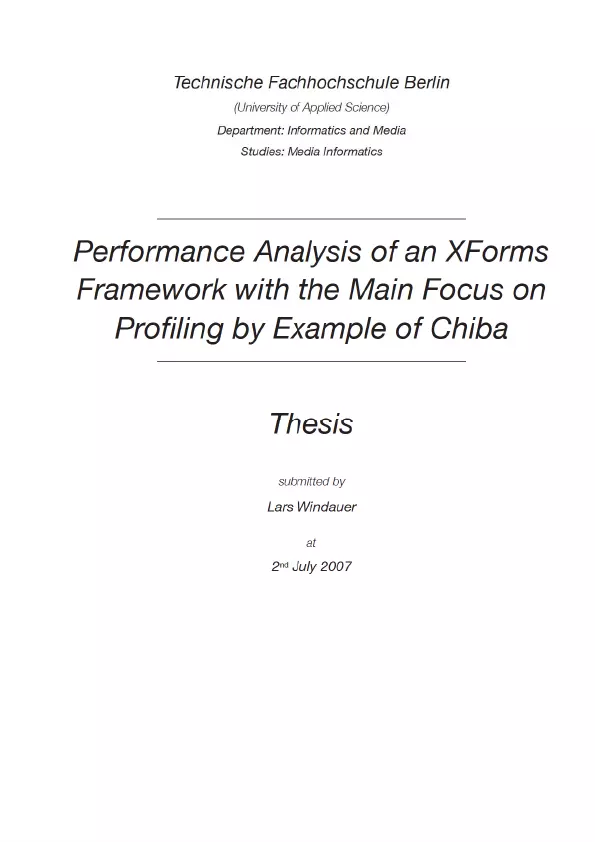The goal of this thesis is to analyse a common XForms framework (Chiba) with the focus on profiling for performance inadequacies and to fix them if possible. A prototype of a largely automated performance measurement setup to underpin the analysis and the verification of enhancements has been designed and implemented.
The thesis starts with a theoretical part to specify terms & methodologies. Before the paper comes to its practical part the analysed project is introduced. Afterwards a practical performance analysis from the first steps to the narrow of the analysed project is exemplarily described.
In detail, chapter 1 Performance & Profiling elaborates how to quantify and profile performance in theory. Chapter 2 Methods introduces various methods to analyse performance. XForms and the analysed product Chiba are presented in chapter 3 XForms / Chiba Fundamentals. The implemented performance analysis is described in chapter 4 Performance Analysis Iteration and chapter 5 Tuning XForms Actions.
The Performance Analysis Iteration focuses on the design and implementation of tests to analyse and validate potential performance shortages, while Tuning XForms Actions illustrates how profiling techniques can be utilised not only to analyse but also to enhance a validated shortage. Finally - in chapter 6 Closing - the results of the analysis and the enhancements are reconsidered.
Inhaltsverzeichnis (Table of Contents)
- Performance & Profiling
- Performance
- Profiling
- Methods
- Modelling Approach
- Measurement Approach
- Testing
- Benchmarking
- Monitoring
- Exhaustive Analysis
- Hotspot Analysis Approach
- Exploring the Domain
- Verify & Validate
- Tuning Approach
- Conclusion
- XForms / Chiba Fundamentals
- XForms
- Chiba
- Conclusion
- Performance Analysis Iteration
- Utilised System
- Profiling Tools Put into Service
- Acquiring Information about Chiba
- Verify Hypothesis About Hotspots
- XForms Test Bundles
- Test Setup
- Verify Hypothesis About Hotspots 3 - XForms Actions
- Tuning XForms Actions
- Tuning preparations
- Analyse Bottleneck
- Confute Hypothesis
- The Tuning Process
- Prove Enhancement
- Finale
- Closing
Zielsetzung und Themenschwerpunkte (Objectives and Key Themes)
This thesis aims to analyze the performance of a widely used XForms framework, Chiba, with a focus on identifying and addressing performance bottlenecks. To support this analysis and verification of improvements, a prototype of a largely automated performance measurement setup was designed and implemented.
- Performance Analysis of XForms Frameworks
- Profiling Techniques for Identifying Performance Issues
- Development of Automated Performance Measurement Setup
- Performance Optimization and Enhancement
- Verification and Validation of Performance Improvements
Zusammenfassung der Kapitel (Chapter Summaries)
Chapter 1, "Performance & Profiling", provides a theoretical background on how to quantify and profile software performance. Chapter 2, "Methods", introduces various methods used to analyze performance, including modeling, measurement, testing, benchmarking, monitoring, exhaustive analysis, hotspot analysis, domain exploration, verification, validation, and tuning approaches. Chapter 3, "XForms / Chiba Fundamentals", introduces the XForms standard and the Chiba framework, which is the subject of the performance analysis. Chapter 4, "Performance Analysis Iteration", details the implementation of the performance analysis, including the design and implementation of tests to analyze and validate potential performance bottlenecks. Chapter 5, "Tuning XForms Actions", showcases how profiling techniques can be used not only to analyze but also to improve identified performance issues. The chapter concludes with a demonstration of how the tuning process can be validated and proven to be effective.
Schlüsselwörter (Keywords)
The main keywords and focus topics of this thesis include XForms, Chiba, performance analysis, profiling, automated performance measurement, bottleneck identification, optimization, and enhancement verification. The thesis explores the application of these concepts in the context of a widely used XForms framework, ultimately contributing to a better understanding of performance analysis techniques and their practical application.
Frequently Asked Questions: XForms Performance Analysis
What is the goal of performance profiling?
The goal is to identify performance inadequacies or "bottlenecks" in software and fix them to enhance overall efficiency and speed.
What is Chiba in the context of XForms?
Chiba is a common XForms framework used to process XML-based forms, which was analyzed for performance shortages in this thesis.
How can performance be quantified?
Performance is quantified through various methodologies such as benchmarking, monitoring, and automated measurement setups.
What is a Hotspot Analysis?
It is a method used to find the specific parts of the code (hotspots) that consume the most resources or time during execution.
How can XForms Actions be tuned?
By utilizing profiling techniques to analyze verified shortages, developers can apply specific enhancements to the logic of XForms actions to improve performance.
- Quote paper
- Diplom Informatiker Lars Windauer (Author), 2007, Performance analysis of an XForms framework with the main focus on profiling by example of Chiba, Munich, GRIN Verlag, https://www.grin.com/document/85134



